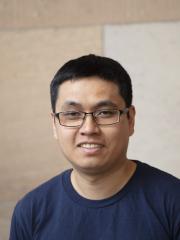
Expertise:
- CRISPR and genome editing
- Genetic engineering in Cell and animals
- Molecular biology
Researcher biography
Di’s research focus is driven by his passion in developing and exploring novel gene editing methodologies to investigate important biological questions. His skills position him well to drive genome engineering innovation at GIH.
Di obtained his Bachelor Degree in Biological Sciences from the Zhejiang University, China, and then worked as a research assistant at Institute of Neuroscience, Chinese Academic of Sciences before moving to Australia to pursue a Master of Neuroscience at Queensland Brain Institute (QBI), UQ. Following his Master’s study, he went on to successfully complete a PhD with Prof. Jurgen Goetz at QBI in 2016, with a research focus on Alzheimer’s disease.
Di has over 12 years laboratory experience in molecular and cellular biology, most recently exploiting a variety of genome engineering approaches to create an array of cell lines and animal models. During his PhD, he successfully introduced TALEN and CRISPR genome engineering techniques into his research laboratory, generating both in vitro and in vivo disease models, and resulting in several first author and co-author papers. After finishing his PhD, Di joined the Queensland Facility for Advanced Genome Editing (QFAGE), a core facility at IMB that provides the CRISPR cell line and mice engineering service for UQ researchers. Di was instrumental in initiating and building the cell engineering capabilities at QFAGE and has been working as facility manager before joining GIH. He developed workflows and optimized the SOPs for CRISPR cell engineering at QFAGE and later at GIH.
Di joined the GIH team in 2019 and since then he has played an integral role in GIH's collaborative research project in CRISPR and genetic engineering. His current research is focusing on optimizing and applying various CRISPR methods in different model systems.
| Featured projects | Duration |
|---|---|
|
Precise genome editing Genome Innovation Hub Collaborative Project (UQ infrastructure) |
2019 |
|
Using transposon-sequencing to probe whole cell protein-protein interactions Genome Innovation Hub Collaborative Project (UQ infrastructure) |
2019 |
|
Automated single cell quantitative in situ gene expression in cells and tissues (AutoMerFISH) Genome Innovation Hub Collaborative Project (UQ infrastructure) |
2019 |
|
OmniCRISPR: a simultaneous and combinatorial approach to the generation of multiple precise genomic alterations Genome Innovation Hub Collaborative Project (UQ infrastructure) |
2020 |
|
Dual gRNA screen Genome Innovation Hub Collaborative Project (UQ infrastructure) |
2019 |
|
Expanding the scope of multimodal single cell sequencing Genome Innovation Hub Collaborative Project (UQ infrastructure) |
2021 |
|
HTS single cell CRISPR technology for experimental validation of population genetics and functional genomics discovery Genome Innovation Hub Collaborative Project (UQ infrastructure) |
2021 |
|
Using nanopore sequencing to test mRNA vaccine quality. Genome Innovation Hub Collaborative Project (UQ infrastructure) |
2022 |
|
Division-based single-cell-sequencing Genome Innovation Hub Collaborative Project (UQ infrastructure) |
2022 |
|
Identification and exploitation of genome landing pads for cattle. Genome Innovation Hub Collaborative Project (UQ infrastructure) |
2022 |
|
Bacterial CRISPRi Genome Innovation Hub Collaborative Project (UQ infrastructure) |
2023 |
|
Improving CRISPR workflows in plants Genome Innovation Hub Collaborative Project (UQ infrastructure) |
2023 |
